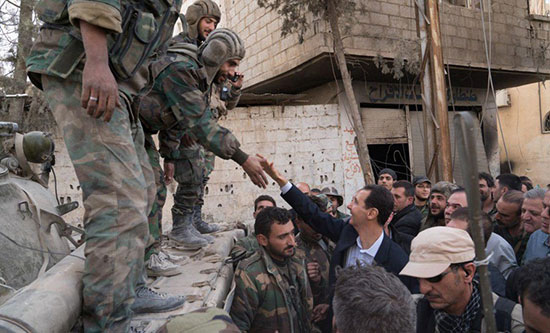
On 14 April the US, Britain and France launched around 100 missiles at Syrian government targets. This was the first overt attack on the state by the two European powers which drew its borders in the Sykes-Picot agreement of 1916. The pretext for these strikes was that a chemical weapons attack was carried out by President Bashar Assad’s government in the city of Douma on 7 April. However, the real intention of the strikes was to send a signal to Russia that its continued encroachment into the Middle East would be met with force. Historically, Britain, France and the US have considered the region their sphere of influence, and control of its resources, trade and transport routes have underwritten their global power. However, other regional powers are gaining influence.
Imperialist strikes
The alleged Douma chemical attack reportedly killed more than 40 people. It is almost impossible to know the truth of the events in Douma in a world dominated by imperialism and its professional machinery of deception. There are many reasons to doubt the story peddled by the pro-imperialist media. We cannot forget the lies which were spun by the imperialists to justify their wars in Iraq (1990 and 2003), Libya (2011) and elsewhere. Whatever the truth about Douma, there are no circumstances in which British imperialism can play a progressive role.
US President Donald Trump quickly seized upon the alleged Douma attacks to warn Russia of the ‘big price’ it would pay for its support for Assad. In our statement on the air strikes we said: ‘This action was intended to reassert imperialist control over the Middle East at a time when it is being undermined. British Prime Minister Theresa May said that British participation in the assault was “to deter chemical weapons attacks in Syria and the UK”. This invocation of the poisonings in Salisbury was targeted at Russia.’ (17 April). On 13 March 2018, Russian Chief of General Staff, Valery Gerasimov had warned that in the event of NATO air strikes: ‘Russia’s armed forces will take retaliatory measures against the missiles and launches used.’ Concern about Russian retaliation limited the scope of the air strikes.
Israel, Iran and Russia
Israel has continued to launch air strikes on Syrian territory. Israel claims it is attacking Iranian and Hezbollah forces and weaponry. It continues to illegally occupy the Syrian Golan Heights which it seized in 1967. One Israeli air strike came hours after Trump threatened consequences following the 7 April alleged chemical attack. Seven Iranians were among the 14 reported killed and 18 were among 26 killed in attacks on 29 April. Israel also launched strikes on 7 May – the day before Trump declared the Iran nuclear deal over.* 20 rockets were fired towards Israel from Syria in retaliation. Israel accused Iran, but Syria claimed responsibility. Israel struck again on 10 May, with its largest attack on Syria in decades, using 28 planes and 70 missiles. Defence Minister Avigdor Lieberman said that Israel had struck ‘all of the Iranian infrastructure in Syria’. Most of the media reports neglected to mention the first Israeli strike, presenting Israel as acting in self-defence.
On 9 May, Benjamin Netanyahu became the first Israeli Prime Minister to attend the Second World War Victory Day celebrations in Moscow, marking the 73rd anniversary of the Soviet Union’s victory over Nazi Germany. Afterwards, Russian President Vladimir Putin met Netanyahu to discuss the Middle East. Within hours, Israel launched its massive 10 May attack on Syria, and Netanyahu said Putin gave him no reason to think that further strikes would be blocked by Russia. Putin is willing to balance other relationships with his support for Assad. Israel is trying to block expanding Iranian influence to its north in a corridor linking Iran to the Mediterranean. Since its violent creation in 1948 Israel has attempted to keep regional powers weak and divided to maintain the imperialist dominance and to serve its expansionist agenda.
Syria’s future
Despite the repeated air attacks on Syrian and allied forces, the government continues to advance in its war against ‘rebels’. In May the areas around Damascus, including the Yarmouk Palestinian refugee camp, were cleared of Islamic State (IS) led opposition fighters. Outside the Kurdish north-east which has maintained autonomy since 2012, the only significant populated area out of government control is the Idlib governate in the north-west. This is largely occupied by jihadist groups such as Tahrir Al Sham – led by Al Qaeda’s Syrian affiliate. Turkey is constructing eight military bases in this area. Trump has announced that US support programmes will be withdrawn from the north-west, in a move towards withdrawal from Syria now that the campaign against IS is ending. Whether the US will withdraw its 2,000 troops from eastern Syria remains to be seen.
Putin raised the issue of a withdrawal of all foreign military forces from Syria in a meeting with Assad in Moscow on 17 May. Russia is leading the diplomatic process begun in the Astana talks in January 2017 which includes Syria and Iran. Assad has agreed to a committee to rewrite the Syrian constitution in a move towards a political process of unification and reconstruction. But the major imperialist powers are unlikely to allow any process which pushes them out of Syria. Trump’s erratic behaviour, and splits within the US establishment, make predicting the US’s next move impossible. Tensions between Israel and Iran will remain high. The US, France and Britain will continue to find ways to reassert their declining influence in the region, meaning the threat of global conflict will continue to increase.
Toby Harbertson
*See our website for a full analysis of the US
Fight Racism! Fight Imperialism! 264 June/July 2018




